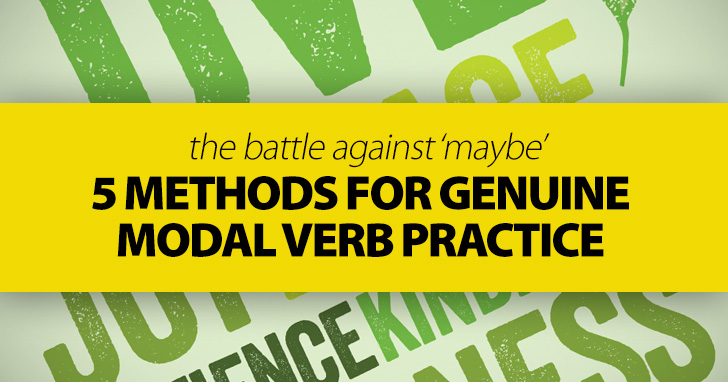
Think of those words which appear too often in your classroom.
For me, it’s ‘like’, that approximate, short-cut word which has become so popular, ‘fine’, which really doesn’t tell me much about how you are, or what you thought of the movie, and ‘maybe’. This last one serves many uses and expresses some degree of uncertainty, but I’ve been trying to persuade my students that there is a lot more nuance available by replacing ‘maybe’ with the family of Modal Verbs.
Just as a reminder, the modal verbs are:
- Can/Could
- May/May have
- Might/Might have
- Will/Would (have)
- Ought to (+have)
- Should (+have)
- Must/Must have (had to)
[In each case, the latter of a pair is the past form, e.g. ‘I can swim a mile nowadays’, versus, ‘I could swim a mile when I was a teenager’, or, ‘That might be George Clooney over there!’ versus, ‘That might have been George Clooney we saw yesterday’.]
I assure my students that mastering the modals is actually pretty easy, as they all operate on a similar formula:
| Present: | Mod. V + inf |
| Past: | Mod. V + have + past participle |
Once the formula is learned, and students begin to differentiate between the modal verbs, their ability to express possibility, probability, permission, ability and willingness becomes more specific and precise.
Let’s try an example. The other day, one of my students said, ‘Maybe I go to movies this weekend’. We fixed the first problem – ‘movies’ takes the definite article ‘the’ – and then discussed when the event was happening. In many languages, including Chinese, there is no change in the verb to express the future form; a time expression is added (‘this weekend’) instead. This works for a lot of English expressions, but here we need ‘will’ because we’re talking about a plan for the future.
Then I asked my student about how likely the event was. Was the student just considering going to the movies (may/might), or had they bought tickets already (‘will certainly’, or simply ‘going to go’, which implies premeditation). I impressed on them how much information is carried by these short, modal verbs; suddenly, I know not only what his plans are, but also how likely they are to happen.
Methods for teaching modal verbs are ably discussed on the site so we’re going to focus on methods for encouraging practice. They all center on considering how we might elicit these words from our students; this is sometimes difficult, especially if they’re uncertain about the usage, so ensure that a simple, visible explication of the structure and its form is clearly expressed on the board, or in the students’ notebooks, before you begin. This gives them a ‘quick reference guide’ which can be very helpful.
The most important thing to remember here (and whenever our students are learning tricky, new structures) is that production is the key. If they have used the expressions spontaneously and accurately, then (and only then) can we say that the language point has been ‘learned’.

Concentrate on Modal Verb Production Using These Ideas
-
1
Seize the Opportunity
Whenever you hear a ‘maybe’ from your students, consider whether a modal verb would express things better, and offer a correction: “‘Maybe he is running late’ is OK, Fiona, but I think ‘He might be running late’ is even better. Actually, it’s already ten minutes into our class, so I’d say, ‘He must be running late!’”
Consider having a chart of the modal verbs on the classroom wall, organized by strength; font size or color could vary to emphasize this change. From weak to strong, they would be ranked something like this:
May – Might – Could – Can – Ought to – Should – Must
Experiment with these modals to see how you feel about their relative strengths.
-
2
What Can You Do?
When first teaching ‘can’, I use a simple game. I ask a student if they can sing, or dance, or play tennis, and receive the appropriate answer (“Yes, I can” / “No, I can’t”). They then ask the student next to them a similar question, and it moves around the circle. At the end, you could ask the class about the abilities of the students we’ve heard from, or use this as a memory game: The student has to list the abilities (or lack thereof) of all the previous classmates, e.g. “Jade can skate and Wang can dance salsa, but Hiroshi can’t play piano”.
A quick word here on pronunciation; I grew up in England, so my “can” is pronounced /kan/ (using the short ‘a’ from ‘map’, ‘cat’ and ‘basket’) while my “can’t” is /ka:nt/ (using the long ‘a’ from ‘arm’, ‘father’ and ‘carpet’). I’ve found this differentiation in the vowel sound useful and clarifying, but if you’re teaching US English, your students should know that Americans don’t make this distinction.
-
3
Twenty Questions
Arrive to your classroom carrying a mysterious box. You can decide what this box (either literally or figuratively) holds, and then use sequential, simple clues to elicit lots of modal verbs from the class. E.g.
Teacher: So, we know it’s not an animal, so it can’t be a cat; but we know it’s expensive and rare, so what could it be?” Students: It could be a diamond! / It might be some gold! / It must be your wedding ring because you’re not wearing it today! -
4
Discuss L1
As I mentioned above, almost every language has a system for expressing relative levels of possibility. Investigate this with your class, perhaps in the form of an interview where students teach their classmates a little of their first language, to show how possibility or permission is expressed. Gaining insight into other languages helps the process of learning English by giving context and examples which prove that modal expressions are actually global, and not restricted to English.
-
5
Story Time
When first teaching modal verbs in the past (would have, might have, could have) I tell the students the story of a young man who is having a terrible day. He wakes up late because he forgot to set his alarm clock. He misses the bus, and forgets his keys. Rather than taking a cab, he waits for the bus, and arrives half an hour late. He misses the beginning of an important meeting, and his boss is furious at this repeated tardiness. Later that day, he finds he has been fired. What should he / could he / might he have done differently?
(e.g. ‘He should have remembered to set his alarm clock ; He could have taken a cab instead of waiting for the bus ; He might have been forgiven if being late was not already his habit.)
Immediately, we’re stepping into the territory of the conditional forms (if…will / if… would / if… would have) and I tend to teach these roughly in parallel with the modal verbs where possible.
In addition, modal verbs crop up on virtually all of my quizzes and exams, checking the students’ understanding of the grammatical structure and the relative strengths of each one. I also incorporate modals into Jeopardy-style games, and demand modal verb-based sentences from late students as a light-hearted punishment.
I hope that your students take quickly to modal verbs and use them with confidence, expanding their ability to express themselves and adding nuance to their English.
P.S. If you enjoyed this article, please help spread it by clicking one of those sharing buttons below. And if you are interested in more, you should follow our Facebook page where we share more about creative, non-boring ways to teach English.







